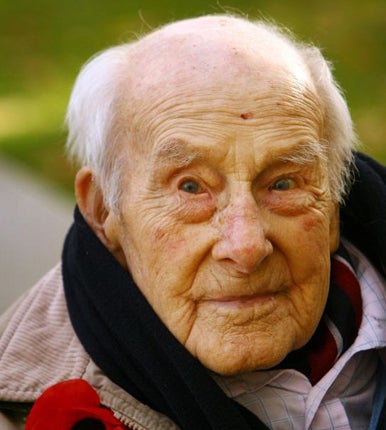'Cigarettes, whisky, and wild, wild women'
... Henry Allingham's recipe for a long and happy life. The world's oldest man and First World War veteran died yesterday, aged 113

Your support helps us to tell the story
From reproductive rights to climate change to Big Tech, The Independent is on the ground when the story is developing. Whether it's investigating the financials of Elon Musk's pro-Trump PAC or producing our latest documentary, 'The A Word', which shines a light on the American women fighting for reproductive rights, we know how important it is to parse out the facts from the messaging.
At such a critical moment in US history, we need reporters on the ground. Your donation allows us to keep sending journalists to speak to both sides of the story.
The Independent is trusted by Americans across the entire political spectrum. And unlike many other quality news outlets, we choose not to lock Americans out of our reporting and analysis with paywalls. We believe quality journalism should be available to everyone, paid for by those who can afford it.
Your support makes all the difference.Millions of his generation were cut down in the mud and slaughter of the First World War. Fate, however, in its arbitrary way, decreed that Henry Allingham should not only survive, but live to bear witness to the horrors of the trenches and the devastation of the Western Front – and for almost another century after that.
Yesterday Mr Allingham, the world's oldest man, oldest surviving veteran of the First World War, and last surviving founder of the Royal Air Force, died aged 113 at St Dunstan's care home in Ovingdean, near Brighton, where he had spent the last years of his life.
Born in 1896 in Clapton, London, he lived in three centuries, and spanned possibly the most momentous period humanity has ever known – the first powered flight, the rise of the motor car, a second more devastating global conflict, space travel, a revolution in popular culture, television, and the internet.
For much of that time, like many First World War veterans, he kept his memories to himself, not turning up to reunions or talking about his experiences to even his closest relatives.
All that changed in 2001 when Mr Allingham, already a centenarian, was tracked down by Dennis Goodwin of the First World War Veterans' Association.
The two were soon friends and Mr Allingham became a figurehead for veterans, writing an autobiography and making numerous public appearances – 60 between his 110th and 111th birthdays alone – to ensure the conflict which scarred his generation was not yet forgotten.
Mr Allingham grew up in London and recalled WG Grace playing cricket in the early years of the 20th century.
He joined the Royal Naval Air Service in 1915 as an air mechanic, supporting anti-submarine patrols and later helping launch planes from armed trawlers during the naval battle of Jutland in 1916, in which 6,000 British servicemen died. Mr Allingham recalled seeing "shells ricocheting across the sea" and had a close call when a shell heading directly for his ship hit the water and bounced over the top.
The following year he was posted to the Western Front near Calais where during the Battle of Passchendaele, the third Ypres offensive, he rescued and serviced aircraft, but saw how the men lived in the trenches
"They would just stand there in two feet of water in mud-filled trenches, waiting to go forward," he said. "They knew what was coming. It was pathetic to see those men like that. In many ways I don't think they have ever got the admiration and respect they deserved."
He was also shot in the arm. "The bullet passed through my arm and out the other side," he said. "They just bandaged me up and sent me out again. It's so long ago that the scar has gone."
In 1918 he married Dorothy Cator and transferred to the newly formed Royal Air Force. When the war ended he left the service and lived quietly, working as an engineer in the motor industry.
The couple had two daughters – both of whom Allingham outlived. He also had six grandchildren, 12 great-grandchildren, 14 great-great-grandchildren and one great-great-great-grandchild. Dorothy died in 1970 after 51 years of marriage.
Yesterday tributes to Mr Allingham, who attributed his longevity to "cigarettes, whisky and wild, wild women", were led by the Prime Minister, Gordon Brown, who described him as a "tremendous character", and the Prince of Wales, who said he belonged to that "incredible generation who did so much for their country".
His friend Mr Goodwin added: "Henry was truly a gentleman – his strength of character, his purpose. He left quite a legacy to the nation of memories of what it was like to have been in the First World War."
"War is stupid," Mr Allingham once said. "Nobody wins. You might as well talk first; you have to talk last anyway."
His death means there are now only two British survivors of the First World War – Harry Patch, 111, and Claude Choules, 108, now living in Australia.
Join our commenting forum
Join thought-provoking conversations, follow other Independent readers and see their replies
Comments